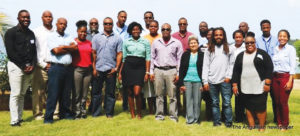
With the start of the 2019 Atlantic hurricane season, mere weeks away, many Caribbean islands are already bracing for the possibility of being hit by a tropical storm or hurricane. One sector which has been particularly hard hit is the fisheries sector. Damage to important fisheries infrastructure and assets, such as jetties, boats, and fishing gear, can cost Caribbean countries millions of dollars in recovery and lost revenue. These damages also have a substantial impact on the livelihoods of those who depend on fishing as a main source of income, and could be a driving force behind increasing poverty in fishing communities. Other climate-related effects such as warming oceans and rising sea levels, also have negative impacts on the sector, including loss of important fisheries habitats.
Ensuring that countries integrate climate change adaption and disaster risk management into the policies and plans for their fisheries sectors is therefore vital for protecting important fisheries ecosystems, securing livelihoods and food production and reducing poverty.
In January 2019, the Caribbean Natural Resources Institute (CANARI) and the Centre for Resource Management and Environmental Studies of the University of the West Indies (UWI-CERMES) hosted training workshops in Anguilla and Montserrat with policymakers, fisheries managers, fisherfolk and other key stakeholders to demonstrate how climate change adaption and disaster risk management can be practically incorporated into fisheries management plans. A total of 69 participants, from both islands, attended the four-day workshops.
The training workshops used the United Nations Food and Agriculture Organization’s (FAO) Ecosystem Approach to Fisheries (EAF) toolbox to help participants decide what practical solutions they could apply given their particular circumstances and resources. Overall, participants found the toolkit easy to use. Participants, in particular, found the section of the toolkit on communication to be very useful, with one participant in Anguilla noting that “communication and the means in which it is carried out, among stakeholder groups, is critical in fisheries planning”.
As a follow-up to the workshops, both Anguilla and Montserrat will take steps to update their fisheries management plans to mainstream climate change adaption and disaster risk management using an Ecosystem Approach to Fisheries.
Part of the training also specifically targeted fisherfolk in an effort to get them more involved in stewardship actions that would help protect and conserve the marine habitats upon which they depend, and reduce their vulnerability to climate change impacts. A small grants call was sent out in March 2019 to fisherfolk organisations in both islands for proposals on projects to address climate change adaptation and disaster risk management through stewardship and innovative solutions. The selected projects will launch in June 2019 and end in December 2019.
The reports of the training workshops in Anguilla and Montserrat are available for download at CANARI’s website:
Anguilla report: http://www.canari.org/wp-content/uploads/2018/09/darwin_eaf-report_anguilla_finalapr2019.pdf
Montserrat report: http://www.canari.org/wp-content/uploads/2018/09/darwin_eaf-report_montserrat-final31.3.2019.pdf
– Press Release







